Get to know more about ICON (ICX) IISS and the impact of i_rep on the network Get to know more about ICON (ICX) IISS and the impact of i_rep on the network
Hi Iconists 👋,
There has been a lot of debate around IISS and i_rep Economics these past weeks.
Through this article, we provide an explanation of what is i_rep, its impact on the network, and what are the consequences of modifying it.
- What is i_rep? i_rep is a governance variable that dictates how much representatives (Main P-Reps and Sub P-Reps) earn in the network. Each of the top 22 Main P-Reps submits an i_rep suggestion, and the network i_rep is then calculated on a stake-weighted basis.
- What is the impact of i_rep on the network? i_rep impacts the resources available for representative operations: how much ICX they earn, but also the inflation of the ICX supply.
- Should P-Reps lower their i_rep? If one top 22 Main P-Rep lowers its i_rep, it impacts the rewards earned by each representative, including the rewards of small Sub P-Reps. Used as a marketing argument, it can also lead to a race to the bottom, out of which only the largest players will be able to keep their operations running. Although some large main P-Reps are earning disproportionate amounts of ICX, there are other ways to rebalance the network, such as changing your votes.
What is i_rep?
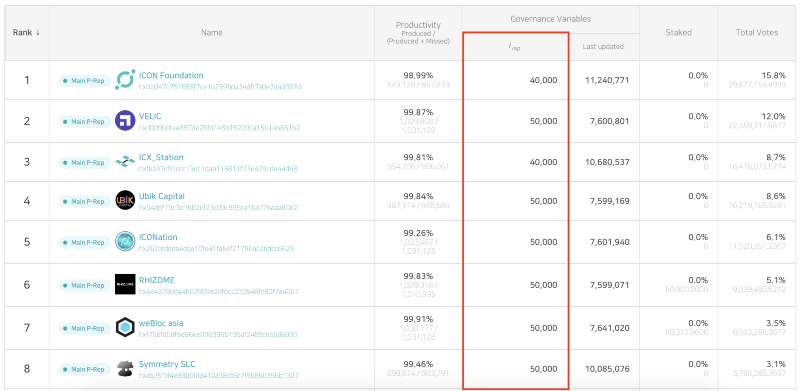
i_rep is a reward suggestion made by ICON Public Representatives (P-Reps). Public Representatives contributes to the ICON ecosystem through block validation and governance. They can set the i_rep variable based on their targeted revenues, operating costs, and profits. It then influences the expected reward amount at the end of each term in a stake-weighted basis, taking into account only the i_rep of the top 22 Main P-Reps. Because of this stake-weighted approach, if any Main P-Rep increases or decreases its i_rep, it impacts the revenues of all other P-Reps in the network (both Mains and Subs).
The rewards pool for Main P-Reps and Sub P-Reps is calculated as per below, with the i_rep variable equal to the stake-based weighted average i_rep of the 22 Main P-Reps:
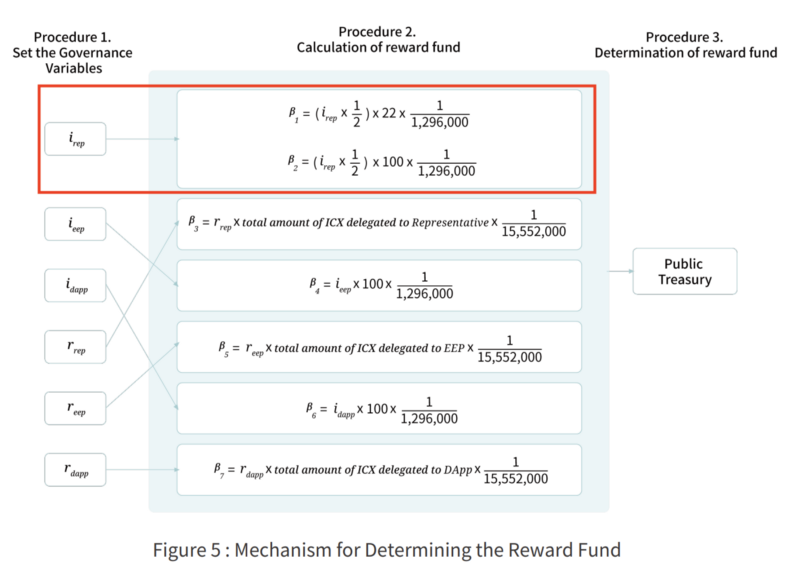
As of 23 November 2019, P-Reps are sharing around 2,850,000 ICX per month rewards:
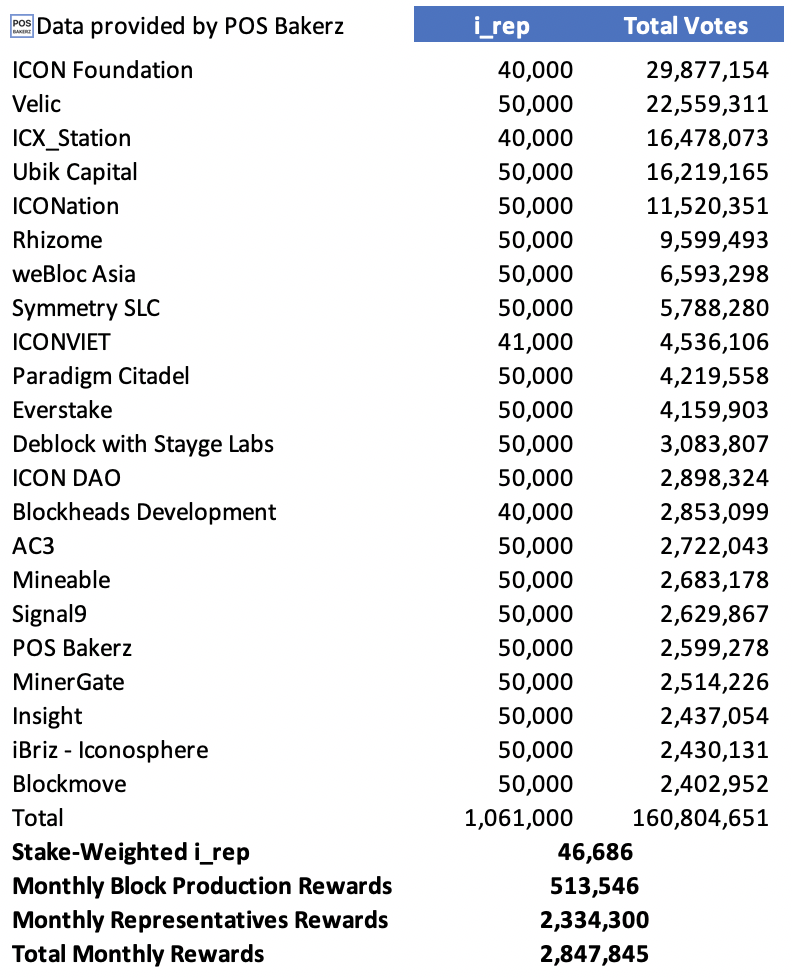
Block Validation Rewards are shared equally among the top 22 Main P-Reps. This means that each Main P-Rep earn 23,330 ICX per month for their role.
Representatives Rewards are shared among the top 100 representatives (22 Main P-Reps and 78 Sub P-Reps), depending on the percentage % of voting rights delegated to them.
All this information can be found on ICON Tracker, as well as the current i_rep: https://tracker.icon.foundation/governance
Now that you understand better how i_rep is calculated, we think it is time to have a more in-depth look at what is the impact of i_rep on the network.
What is the impact of i_rep on the network?
Inflation
Inflation refers to an increase in price levels due to an increase in the quantity of money. In the case of ICON (ICX), when delegator and representative rewards are distributed, new coins are created, which leads to higher supply in the number of tokens, and a decrease in ICX value: prices measured in ICX (other tokens, goods, and services) should in theory increase.
Representative rewards come from a different pool than Voter rewards. Hence, when Main P-Reps increase or decrease their i_rep, the amount of rewards received by voters remains unchanged. However, by setting a different i_rep, they influence the overall inflation of the network, and in theory, the value of the token.
Below is a table approximating what would be the total rewards and inflation of the token depending on the overall i_rep (assuming that the top 22 Main P-Reps all set-up that i_rep):

Representative Finances
i_rep determines how much both Main P-Reps and Sub P-Reps earn. The higher the i_rep, the higher the number of rewards. The lower the i_rep, the lower the number of rewards. Representatives use ICX generated by i_rep to finance their operations: maintaining a secure validation infrastructure, creating content, building products for the ecosystem, being involved in governance decisions, testnets, and other various tasks.
Should P-Reps lower their i_rep?
Initial Governance Variable
i_rep was initially set up at 50,000 based on an ICX price of $0.40. The main goal of i_rep is that representatives can sustain their operations and have incentives to contribute to the network. Network infrastructure and labour for such operations are costly, as well as event organization and marketing. While the debate is currently centred on lowering i_rep, it is essential to note that at current ICX prices ($0.12), representatives are earning 3x less than what was initially planned. While large P-Reps can easily maintain a secure infrastructure with such revenues, this is very impactful for Sub P-Reps, which, as highlighted below, are less attracted by the opportunity of doing so:
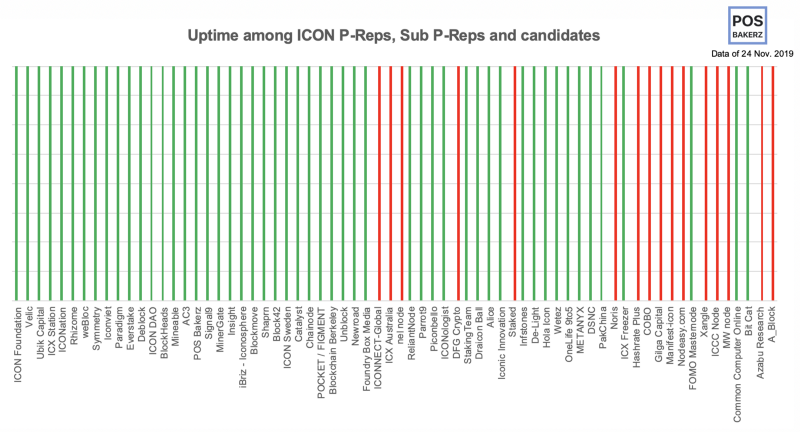
Shared Impact
When debating i_rep, since the network i_rep is determined on a stake-weighted basis, it is essential to note that when any of the top 22 Main P-Reps modify their i_rep, it impacts the network i_rep. The one that modifies its i_rep does not charge more or less than the other representatives but impacts how much the overall set of representatives is currently charging.
While a large Main P-Rep could easily sustain a network i_rep of say 10,000 or 20,000 at current ICX prices, such a level would be unsustainable for lower-ranked Sub P-Reps, which are already quite inactive for a large number.
As community members, it can be tempting to pinpoint how the top 5 P-Reps are making a large number of rewards and to pressure them into lowering their i_rep. Nonetheless, it is essential to note that if they lower their i_rep, the overall network is impacted by this new revenue structure, and Sub P-Reps operating at breakeven or at a small loss will now operate at a larger loss.
Because of this shared impact of i_rep, we believe that the best solution would be to redelegate from these large players to smaller ones out of the Top 5. Votes are very concentrated among these large players, and this is the main reason why they can make such large amounts of ICX.
Below is a table illustrating what would be the impact on the network if a large P-Rep would diminish its i_rep by 30%:
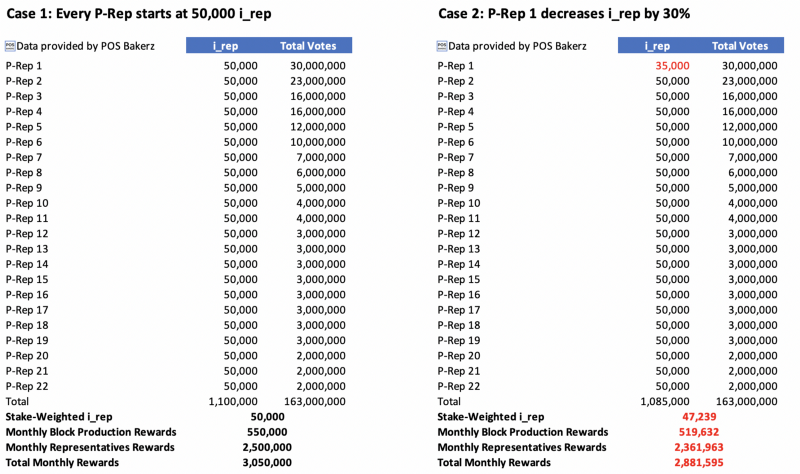
Race to the bottom
This expression refers to a competitive state where companies attempt to undercut competitors’ prices by sacrificing quality. Although i_rep does not correspond directly to the price charged by the representative, it has appeared to be a marketing element in some P-Rep strategies, campaigning as being cheaper than the competition.
While lowering i_rep can be a good decision, we believe that it should be taken by consulting the overall ICON community. There are a couple of issues that have to be solved with the current IISS mechanism, and these issues are being debated in the forum. Yes, large P-Reps are getting too many rewards, and yes, lowering i_rep would mean lowering their rewards as well as the inflation of the network. But this would also mean lowering the rewards of many lower-ranked representatives, including Sub P-Reps, which currently have little incentives to be proactive in the network.
We also believe that if lowering i_rep becomes a competitive marketing argument, we could see further waves of cutthroat competition with i_rep going from 50,000 to 40,000 and potentially further down. What happens when i_rep lowers too much? representatives will start earning less, and in our case, we think that the concern should be specifically on Sub P-Reps since most of them at the moment are running at a loss and cannot afford further lowering.
Don’t get us wrong; we are not against lowering i_rep. We think that this variable is actually made so that we can modify it. However, such modifications have significant impacts on the whole ecosystem and cannot be taken without proper consultation with all the relevant stakeholders. Plus, i_rep should not be a campaign argument for P-Reps, but rather a quite stable variable that evolves after thorough analysis and community debate. For now, POS Bakerz does not plan to increase or decrease its i_rep.
For further questions and debate, we would love to chat with you on Telegram: https://t.me/posbakerz
For IISS enhancements debate, please join the forum discussion here: https://forum.icon.community/t/iiss-enhancements/209
Get to know more about ICON
- POS Bakerz P-Rep Proposal
- IISS Technical Paper
- ICON Website
- ICON Tracker
- The Iconist (dedicated media about ICON and its ecosystem)
- Github
- ICON Official Telegram Channel
- ICON Non-Official European Community Telegram
- POS Bakerz Medium on ICON
DISCLAIMER: This is not financial advice. Staking and cryptocurrencies investment involves a high degree of risk and there is always the possibility of loss, including the loss of all staked digital assets. Additionally, delegators are at risk of slashing in case of security or liveness faults on some PoS protocols. We advise you to DYOR before choosing a validator.


Join the conversation